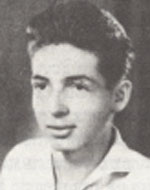Zolman, Meir Shmuel (Mark)
Meir-Shmuel (Mark), son of Esther and Chaim (Henryk), a Holocaust survivor, was born on August 31, 1948 in Lodz, Poland, and immigrated to Israel in 1951. He studied at the Dafna school in Kibbutz Dafna. Meir was drafted into the IDF in mid-November 1966 and was assigned to the Infantry Corps, where he was trained in a parachuting course, a scouts course and a course for infantry commanders. His friends said it was hard for him to adapt to the strict lifestyle and discipline of the military regime. His commanding officer said: “He acted in his own way, which did not always coincide with the regular way, with regards to the discipline and the military order, but on every military issue, I could rely upon him. I did not have a single moment of doubt about his personal ability – as a fighter and as a commander. He was a special young man who was enthusiastic about every operational action, and his criticism was constructive: to improve performance ” For his part in the war in 1967 he was presented with the “Six Day War” award. After he was discharged from regular army service, he was accepted to Ben Gurion University of the Negev and finished the Psychology program. Meir loved others with all his might. He knew how to cultivate close, unmediated, unselfish relationships with others. He knew how to listen to and understand others, to empathize with them- in their desires and sufferings, and with great readiness he would help each person with deed and advice. Because he wanted to understand the human soul and its ways of thinking, he studied psychology. He was hospitable with great warmth and generosity, and his house was open to all his friends, each of whom felt like his own. He had a deep sense of integrity and justice, and an act of injustice stirred him up and stirred his spirits. Meir disliked coercion and a restrictive framework. He was very independent and very resourceful. Overcoming difficulty was a challenge for him. Once he said: “The taste of life is in the difficulty and struggle.” He had a strong ambition, and he was not afraid to face every obstacle. Meir was endowed with a poetic soul and power of imagination, and he could share the power of an experience that impressed him. He was impressed by all the beauty, and he became exalted by the beauty of landscapes or works of art. He was naturally curious and wanted to delve deeper into things, to investigate and understand them. He was always looking for the unknown, the innovative, the unusual. He was eager to meet new people and travel to distant places, to breathe air from new distances and expanses. His wanderings led him to South America, where he toured and visited the most remote sites, and was replete with experiences, which he would recount at every opportunity. At each recounting, he was filled with enthusiasm, as if it was the first time. When the Yom Kippur War broke out, Meir was drafted and sent with his unit to the front in Sinai. On the 17th of Tishrei 5734 (October 13, 1973), he fell while fulfilling his duties and was brought to eternal rest in the cemetery at Kibbutz Dafna. He is survived by a wife, parents and sister. After his fall, he was promoted to sergeant. His family published a booklet in his memory containing memoirs, letters, poems and photographs; Ben Gurion University of the Negev published a book in memory of its students who fell in the war, and Meir was among them.
